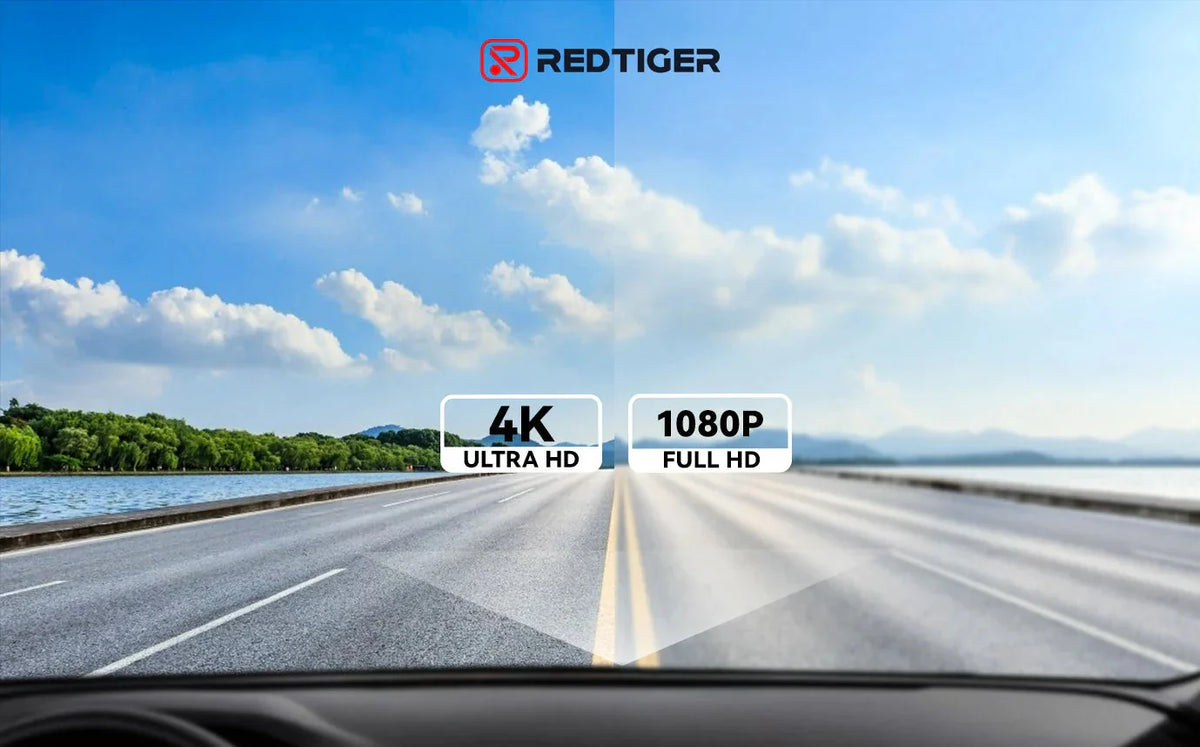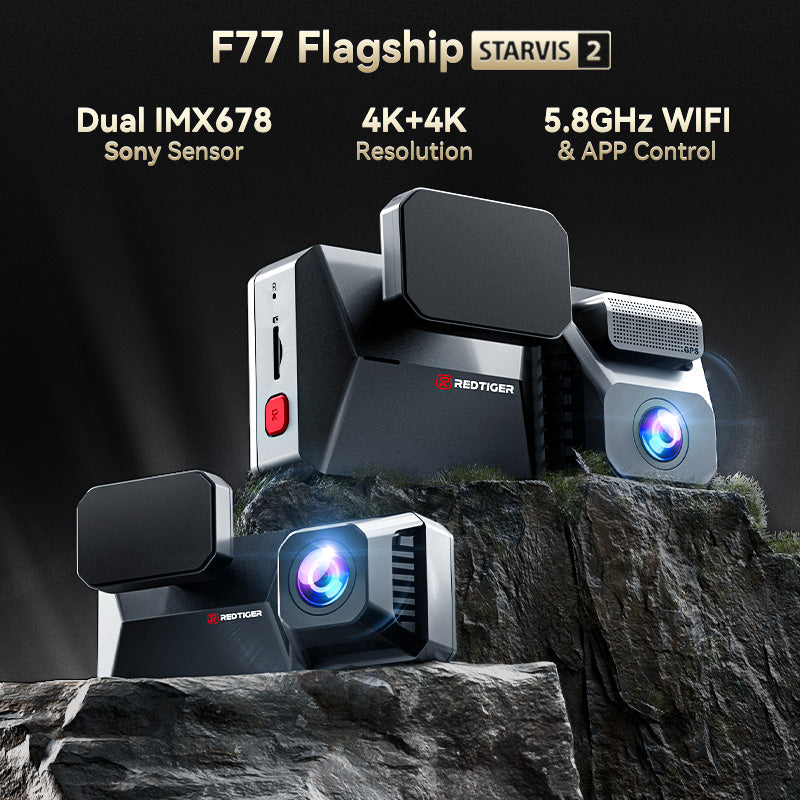

When you are looking at dash cams, one of the main things you think about is resolution: 1080p vs 4K. You want a dash cam that captures clear and strong footage so you have proof if anything happens on the road. Choosing between 4K vs 1080p dash cam models changes how well you can see things like license plates, road signs and important little details if you ever need to use the video as evidence.
Many drivers ask if the difference between 1080p vs 4K is easy to notice in real life. They want to know if a 4K dash cam really does more for you or if 1080p is just fine for everyday use. In this article, you can see what makes 1080p vs 4K resolution different, what the numbers mean and how brands such as Redtiger Dash Cams create cameras that you can rely on.
Why Resolution Matters in Dash Cams
When you know why resolution makes a difference, it will help you choose the best camera for your car.
License Plate Recognition
When you use a dash cam, you want to read license plates easily. With 4K vs 1080p comparison, you will see that 4K resolution has four times the pixels of 1080p, so you can see numbers and letters much clearer—even if you zoom in. This can really help you if you ever need to use the video as proof.
Accident Evidence Quality
When your car is involved in an accident, what your dash cam records becomes your backup. If you have a 1080p vs 4K dash cam, it affects how much you catch on video. 4K dash cams capture sharper images so you can see more important details, while 1080p dash cams might record softer video, especially if it is dark or raining.
Real-World Driving Situations
Driving can be different every day. Sometimes it’s the small things like a glint off a car, that matter most. With 1080p vs 4K resolution, a 4K dash cam helps you see details and objects more clearly. This means the video you record is sharper compared to what you get with a 1080p dash cam.
Insurance & Legal Proof
Insurance companies look at all the details before they make a decision. When you have a 4K vs 1080p dash cam, the extra sharpness can help people see what really happened. When you are in a situation like a rear-end collision, being able to show very clear video can be important.
Night and Low Light Recording
You may find yourself driving at night or in low light. 1080p vs 4K comparison becomes clear here too. Cameras with more pixels and good sensors make it easier to spot people, headlights and lane markings. 4K dash cams do a better job of showing clear details in tough lighting compared to 1080p dash cams.
4K Resolution vs 1080p: What the Numbers Mean
Understanding what makes 4K different from 1080p isn’t hard. It all comes down to how many pixels are in each image. 1080p video has 1920 x 1080 pixels which means there are 2.07 million pixels on the screen. In 4K video, you have 3840 x 2160 pixels which adds up to 8.29 million pixels.
With four times as many pixels, 4K video holds a lot more information than 1080p. If you look closely or zoom in on something like a road sign or license plate, footage from a 4K dash cam stays clear and sharp, while 1080p video can get blurry.
Resolution |
Pixel Count |
Megapixels |
Detail Level |
1080p |
1920 x 1080 |
~2.07 MP |
Standard clarity for daily driving |
4K |
3840 x 2160 |
~8.29 MP |
Four times more detail, sharper zoom |
This chart explains why many people upgrade from 1080p to 4K dash cams like the Redtiger 4K dash cam—it’s for the extra clarity and for feeling safer on the road.
Key Technical Differences: Beyond Pixel Count
There’s more to dash cam performance than just how many pixels your camera has.
Frame Rates
A 1080p dash cam can often record smoother video at higher frame rates like 60 frames per second. Many 4K dash cams record at 30 frames per second. A smoother video can show fast-moving things like a speeding car, more naturally.
Storage Impact
When you record in 4K, each video takes up more space on your memory card than 1080p videos do. If you like to record your long drives, you’ll want to use a larger memory card or turn on loop recording so old files are replaced as you go.
Hardware Demands
A 4K dash cam needs a stronger processor to deal with all the extra pixels. In comparison, a 1080p dash cam works with simpler hardware which may last longer and stay cooler during long trips.
Compression & Bitrate
Dash cams compress the video files to save storage space. 4K dash cams usually need a higher bitrate which means larger files and fewer hours of saved video compared to 1080p dash cams.
Power Consumption
Recording at a higher resolution uses a bit more electricity. If you rely on parking mode or keep your dash cam running for hours, the 4K dash cam may draw slightly more power than a 1080p dash cam.
1080p vs 4K Dash Cam: Real-World Performance
What you see on paper is important, but what matters even more is how a dash cam works during your daily drives.
Daytime Detail
When the sun is shining, a 4K dash cam lets you see crisp trees, other cars in the distance and the lines on the road. A 1080p dash cam records fine for most uses, but video might not look as sharp when viewed up close.
Night Vision
If you have a 4K dash cam for night driving, you may notice that 4K dash cams with good sensors show headlights, people and street signs more clearly than 1080p dash cams. The extra resolution helps keep the video sharp and less blurry.
Weather Resilience
Rain, snow and fog put your dash cam to the test. 4K dash cams can keep a better focus on important details like edges and shapes, while 1080p dash cams might lose some clarity in poor weather.
Parking Protection
When your car is parked, your dash cam keeps recording when it detects movement. You can spot faces and license plates much more easily with a 4K dash cam than with a 1080p model. This can be helpful if you face a hit-and-run parking incident.
Zoom & Review
When you need to look at your video later, a 4K dash cam lets you zoom in on a license plate or detail without losing clarity. On a 1080p dash cam, the picture can get pixelated when you zoom in, making it harder to see what happened.
Choosing the Right Dash Cam: Matching Resolution to Your Needs
The right choice comes down to what you need from your camera. Think about your routine and what matters most for your driving.
Prioritize 4K Dash Cam If:
- You often drive in busy areas where being able to see license plates well is important
- You want clearer night recordings and better low-light footage
- You leave your car parked in places where you need your dash cam for extra security
- You want to look back at your videos and have all the details available, especially for insurance cases
Opt for 1080p Dash Cam If:
- You prefer to store more hours of video on a memory card
- You have shorter drives or don’t need super fine detail
- Your budget is smaller but you still want to record important events
- You want a dash cam that is easy on storage and power use
Feature |
1080p Dash Cam |
4K Dash Cam |
Pixel Count |
2.07 MP |
8.29 MP |
Daytime Clarity |
Good |
Excellent |
Night Performance |
Average |
Strong |
Storage Space Required |
Lower |
Higher |
Best For |
Daily commuters |
Safety-focused drivers |
With Redtiger Dash Cams, you can pick either 1080p or 4K so you get the one that matches your driving and your needs.
Conclusion
When you think about 1080p vs 4K dash cam, your choice depends on how detailed you want your videos to be. A 4K dash cam gives you more sharpness and can help a lot if you need to show what happened in an accident. A 1080p dash cam still works well and records what matters, but with smaller files that are easier to save for longer.
If you value high detail, clear evidence and modern features, you should look at Redtiger 4K Dash Cams for your car. If longer recording time and cost are your biggest concerns, Redtiger 1080p Dash Cams give you strong performance and peace of mind as well.
FAQs
How many pixels in 1080p vs 4K?
1080p has about 2.07 million pixels (1920x1080) and 4K has about 8.29 million pixels (3840x2160). With 4K, you get four times the detail of 1080p.
Is 1080p vs 4K noticeable?
Yes, it is. With a dash cam, you easily notice the difference when you try to read license plates or look at road signs. 4K video stays sharp even when you zoom in, while 1080p can start to look blurry.
Should I get a 4K or 1080p dash cam?
Go for a 4K dash cam if you want very clear images in busy traffic or need strong evidence. Go for a 1080p dash cam if you want to save money and need more recording time.
What’s the best resolution for night driving?
A 4K dash cam with good sensors is usually better at night. It helps you see headlights and things in the dark better than a 1080p dash cam.

